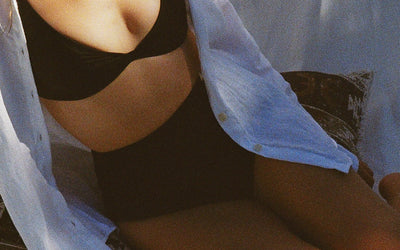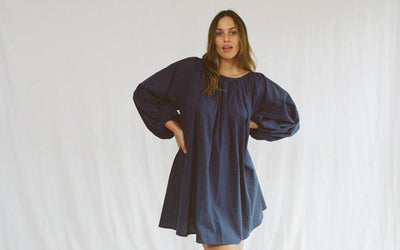Purposeful Production and Wilde Women with Seer & Wilde founder, Ash Sweden
Interview via Ethical Made Easy, BY LOLA ASAADI
We all know the fast fashion industry to be wasteful and cut throat, though one woman is trying to steer it in the opposite direction. Ashleigh Sweden, the founder of ethical fashion brand Seer & Wilde, is doing everything in her power to craft a company that is as good for the planet as it is for its people. and my, what power she has.
What made you start Seer & Wilde?
I was getting so frustrated with the fast fashion world, and I struggled for a while to find swimwear that would fit my body and retain its shape. One day I was at the beach with my husband, and it just clicked and I thought “I’m going to make swimwear that makes people feel good”. I then started working tirelessly to come up with the label it is today. However, I knew I wanted to create something meaningful. I needed my label to reflect my own personal expectations of protecting the environment, human rights, sustainability and minimalism. It was important to me from day one to be a part of something bigger, and to have a purpose behind what I was actually going to do with Seer & Wilde and the direction I wanted my label to take.
I really wanted to create a wardrobe for the woman who spends time by the ocean. Who is carefree but still wants to feel beautiful in what they wear. For the woman who cares about mother earth, and feels a responsibility to protect her. For the mother that is exhausted, and puts herself as a low priority in this world. If my clothing and swimwear can make women feel beautiful and like they are contributing to a better world then my job is done.
Do you have a morning routine? If so, what is it you do to set yourself up for the day ahead?
My mornings usually consist of being woken up at 6am by my 17 month old – I then take Marlow for an hour walk before we head back home for breakfast. My mornings are usually the busiest part of my day, as I am juggling my daughter, picking and packing orders for Seer & Wilde, catching up on emails, and managing SW social media – all before heading off to my 9-5 job. It’s chaos but I love it.
What’s the biggest barrier you’ve found to succeeding as a socially conscious business?
There are actually a lot of barriers when you are starting out as a small business, and these seem to amplify when you are also a socially conscious label. Education seems to be the biggest barrier, as a sustainable, ethical business our prices are higher. A lot of people don’t understand why that is, and the reasons behind local businesses pricing so a lot of my focus is on educating our following as to why that is. SW can never compete with fast fashion, nor do we want to but it’s important to me that my customers understand exactly why they pay what they do for our pieces.
I think some people assume because you own your own business you must have a lot of money and that just isn’t the case. We re-mortgaged our home, and every dollar of my personal savings went into SW – so as a small label I can’t afford huge marketing costs, or additional staff so I am having to carry the load on my own which can be really hard at times, as it limits my reach in educating as much as I would like to.
Within the ethical fashion community, there’s a big question that we ask which is ‘who made my clothes?’. In the scope of Seer & Wilde, who made the things you sell? Can you tell us a bit about them?
Our resort wear is all made in New Zealand. It is very important for me to work with New Zealand creatives, and support our industry while making sure the companies I am working with have a similar ethos as myself. Our Makers are all based in Auckland (The Pattern Table) and their working conditions reflect New Zealand standards, which include living wages, maternity leave, and a safe environment.
As a small business, we are unable to make and produce our own fabric the way we would like to. However, we do choose to support small family businesses in Auckland (O’Neill Textiles, Walls Fabrics, Fabric Merchants) where we are able to buy off cuts from other labels production runs. My dream is to one day be able to create my own fabrics from scratch and be able to follow that process myself, but right now being such a small label we are currently unable to do so.
Our organic cotton swing tags, labels, care cards, corozo buttons and compostable courier bags are all created and purchased through other small businesses in Auckland – so when you support SW you are actually supporting a dozen other small businesses in New Zealand.
Our Swimwear, is made in Bali, due to New Zealand not having the right machines to sew our swimwear. I found a small swimwear factory (King Trade) that met all my working standards, and health regulations. Our swimwear fabric (Econyl and Repreve) are made from man-made ocean waste and transformed in Italy. It is then sent to our factory for production. I would love to have my swimwear made in New Zealand, however the industry is only just now returning, as a lot of labels moved production overseas due to customers demanding lower prices. A lot of machines that were needed to support a range of materials were then sold overseas. People are starting to take notice now, and there has definitely been a shift so I am excited to see what we will be able to do in the future as well as watch the industry flourish here in New Zealand.
Why did you pick the fabrics you have chosen to work with?
I did A LOT of research before I launched my label. I wanted to gain as much knowledge as possible about the industry – the good and the bad so I could make the right choices for SW. After all my research, I committed to using 100% natural fibres. So my main focus is on linen, organic cotton, and hemp for my resort wear. It can be really tricky sometimes as a lot of fabrics contain synthetic fibres, so it can limit the range of fabrics I can offer. However, after learning the effects of synthetic fibres on the environment, the long-term pollution it creates and how mass produced they are I will always stick to my ethos of being a natural label that will always put mother earth first.
Best piece of advice you have ever received?
In this industry there is a lot of pressure to constantly create new styles, and drop new collections to keep up with the demand the fast fashion industry created. The best advice I ever received was from another designer telling me to always stick to my morals, and never amend the label to reach other people’s expectations. I have always referred back to that, and it keeps SW on track when I’m feeling like I’m not meeting the expectations of others.
What’s next for you and Seer & Wilde?
I am actually really excited for what’s to come for Seer & Wilde. I always want to keep my label small and manageable, however I am always thinking of ways to offer diversity to my following. Over lock down last year, it gave me so much time to reflect on the direction my label was taking and also allowed myself time to learn new skills so I could personally make pieces for SW.
This year I’m dropping a vintage collection, which will be constantly added to over the year. I wanted to offer one-off pieces at a lower price for the women who wanted sustainable pieces but were unable to afford the more expensive styles we offer. I will also be dropping a jewellery range that I’ve personally hand-made for Seer & Wilde. My second love is jewellery, so to be able to learn how to create pieces that I love and would represent the Seer & Wilde women has been amazing and I am so excited to share it with everyone.
One book and/or documentary everyone should read/watch? Why?
My favourite book is Light Is The New Black, by Rebecca Campbell. It literally changed my life. The book is about embracing your uniqueness and about being authentically you. The book is about reconnecting you to the core of your being, and guiding you to use it to change the world.
I have two documentaries/movies that I love. Being in the fashion industry The True Cost Documentary was a real eye opener and really changed my perspective on an industry I had known nothing about at the time it was released.
My favourite movie is Okja, by Bong Joon Ho. It’s a beautiful film, and really thought-provoking. The film is about showing compassion for creatures lower on the evolutionary chain and subtly touches on the genetically modified organisms (GMOs) currently being used in so many of our foods. It’s a really emotional film, and you walk away feeling like it changed something inside you.
Are there any other Movers & Shakers out there in your world that you think people should know about?
There are so many! I wouldn’t even know where to start. However, Rosie from SLOWMO (instagram slowmo) is a game changer. Her content is amazing, as she speaks openly and honestly about the issues within the fast fashion industry, but does it in such a way that she educates people in a non invasive way. Anyone who is wanting to delve deeper into this topic should definitely head over and check out her instagram page.


